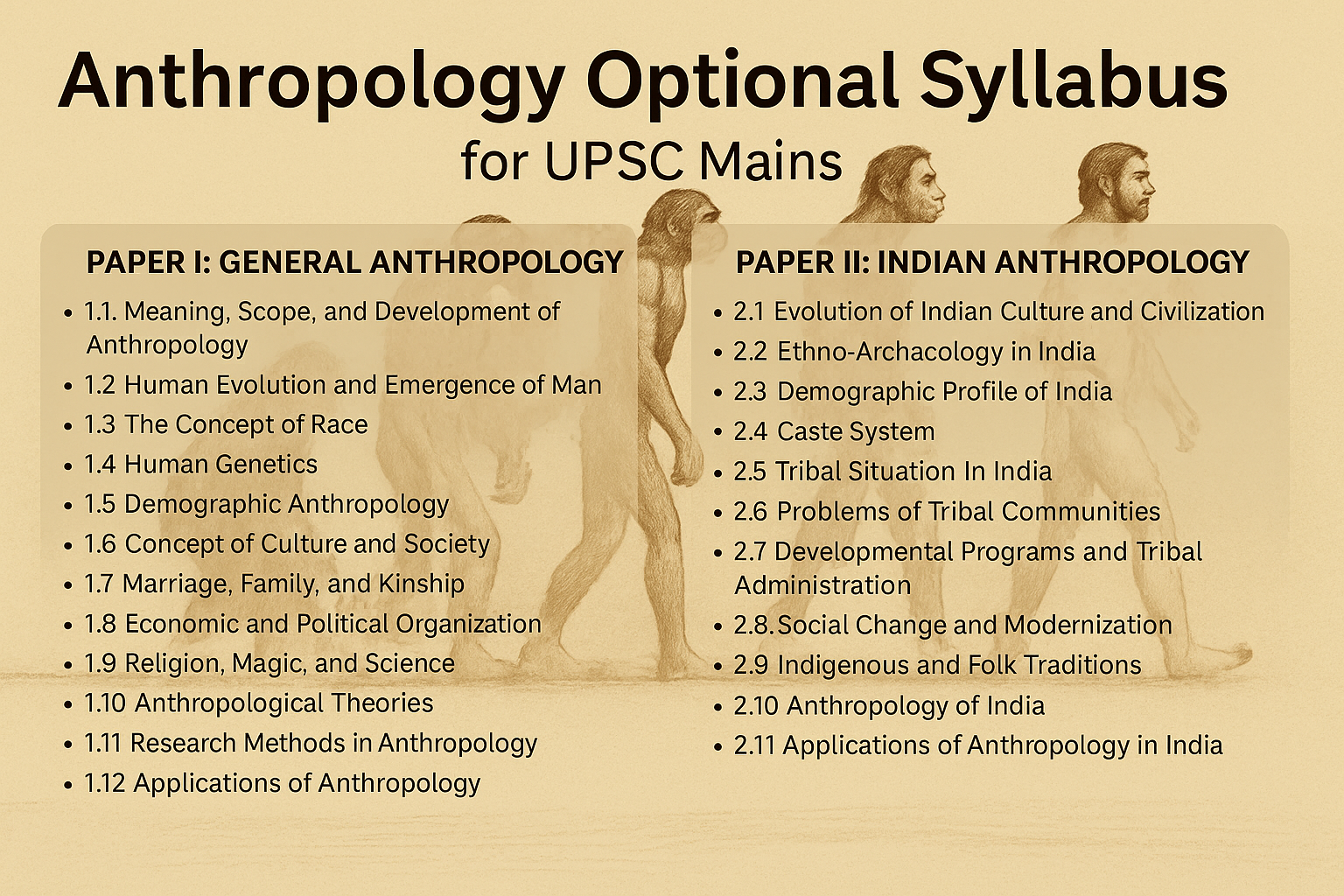Anthropology Optional Syllabus for UPSC Mains
Anthropology is one of the most popular optional subjects in the UPSC Civil Services Examination due to its interdisciplinary nature, conceptual clarity, and concise syllabus. It helps in GS papers and essay writing too. The syllabus is divided into Paper I (Theoretical and General Anthropology) and Paper II (Indian Anthropology).
Join WhatsApp community for Free Notifications, Updates, Study Material, Mock Tests, Internship Updates, and Current Affairs - CLICK HERE TO JOIN
Paper I: General Anthropology
This paper deals with the foundations, theories, and methods in Anthropology, including biological, socio-cultural, and archaeological dimensions.
1.1 Meaning, Scope, and Development of Anthropology
- Definition and branches of Anthropology: Biological, Socio-cultural, Archaeological, and Linguistic.
- Relationship with other disciplines: Sociology, Psychology, History, Political Science, Biology, etc.
- Development of Anthropology in India and globally.
1.2 Human Evolution and Emergence of Man
- Theories of organic evolution: Darwinism, Neo-Darwinism, Lamarckism, and modern synthetic theory.
- Phylogenetic status, characteristics, and distribution of Pre-Hominid and Hominid forms.
- Australopithecines, Homo habilis, Homo erectus, Neanderthal man, Cro-Magnon, and modern Homo sapiens.
- Fossil records and dating methods: Carbon dating, Potassium-Argon method, etc.
1.3 The Concept of Race
- Race and racism: Historical context and critique.
- Racial classification: Traditional (Mongoloid, Negroid, Caucasoid) vs. Modern genetics-based classification.
- Criteria of classification: Skin color, hair, cranial features, blood groups, etc.
- Race vs. Ethnicity and implications in modern times.
1.4 Human Genetics
- Principles of Mendelian genetics.
- Chromosomes, DNA, gene mutations, and hereditary diseases.
- Genetic markers in human populations (blood groups, enzyme polymorphism).
- Genetic drift, gene flow, mutation, and natural selection in human evolution.
1.5 Demographic Anthropology
- Population genetics and structure.
- Fertility, mortality, migration trends in tribal and rural populations.
- Relevance of demographic studies in development planning.
To Enroll in FIRST IAS INSTITUTE - Click Here
1.6 Concept of Culture and Society
- Definition and characteristics of culture and society.
- Components of culture: material and non-material.
- Cultural relativism, ethnocentrism, enculturation, acculturation.
- Social structure, organization, and institutions: family, marriage, kinship.
1.7 Marriage, Family, and Kinship
- Types of marriage: monogamy, polygamy, polyandry, group marriage.
- Rules of marriage: endogamy, exogamy, incest taboo, preferential and prescribed.
- Types of family: nuclear, joint, extended.
- Kinship systems: classificatory vs. descriptive; lineage and clan.
1.8 Economic and Political Organization
- Forms of economic systems: foraging, pastoralism, horticulture, agriculture, industrialism.
- Redistribution, reciprocity, and market exchange.
- Types of political organization: band, tribe, chiefdom, state.
- Law and justice in stateless societies.
1.9 Religion, Magic, and Science
- Anthropological theories of religion (Tylor, Frazer, Durkheim, Malinowski).
- Functions of religion in tribal society.
- Magic, witchcraft, and sorcery: social functions and psychological significance.
- Totemism and animism.
1.10 Anthropological Theories
- Classical Evolutionism (Tylor, Morgan), Diffusionism (British, German, American), and Historical Particularism (Boas).
- Functionalism (Malinowski, Radcliffe-Brown), Structuralism (Levi-Strauss), Culture and Personality (Mead, Benedict).
- Neo-evolutionism (White, Steward), Symbolic and Interpretative Anthropology (Geertz, Turner).
- Post-modernism in Anthropology.
1.11 Research Methods in Anthropology
- Fieldwork tradition and ethnographic methods.
- Participant observation, interviews, case studies, genealogical method.
- Comparative method, statistical and qualitative data analysis.
- Ethical issues in anthropological research.
1.12 Applications of Anthropology
- Development Anthropology, Medical Anthropology, Urban Anthropology.
- Forensic Anthropology.
- Applied aspects of biological anthropology in health, nutrition, and genetics.
- Role of anthropology in planning and policymaking.
Join WhatsApp community for Free Notifications, Updates, Study Material, Mock Tests, Internship Updates, and Current Affairs - CLICK HERE TO JOIN
Paper II: Indian Anthropology
This paper focuses on the application of anthropology in the Indian context, covering Indian society, tribal communities, and applied aspects.
2.1 Evolution of Indian Culture and Civilization
- Prehistoric cultural stages: Paleolithic, Mesolithic, Neolithic, Chalcolithic.
- Protohistoric cultures: Indus Valley Civilization, Vedic Culture.
- Contributions of tribal communities to Indian civilization.
2.2 Ethno-Archaeology in India
- Concept and scope of ethno-archaeology.
- Application in understanding prehistoric cultures through present-day tribal societies.
2.3 Demographic Profile of India
- Demographic data: census trends, population growth.
- Composition of population by language, religion, region.
- Tribal and rural population structure.
2.4 Caste System
- Origin and evolution of caste in India.
- Theories of caste: religious, racial, occupational, evolutionary.
- Caste in contemporary society: changes and continuity.
- Caste and politics, reservation policies.
2.5 Tribal Situation in India
- Tribal distribution in India: geographical and ethnographic.
- Problems faced by tribes: land alienation, displacement, poverty.
- Tribal classifications (scheduled tribes, PVTGs, etc.)
- Tribal economy and society.
2.6 Problems of Tribal Communities
- Social exclusion and marginalization.
- Issues of identity, autonomy, and rights.
- Health, nutrition, and education among tribes.
- Forest policies and impact on tribal life.
2.7 Developmental Programs and Tribal Administration
- Constitutional safeguards for STs: Fifth and Sixth Schedules.
- Tribal Sub-Plan, Integrated Tribal Development Project (ITDP), and Vanbandhu Kalyan Yojana.
- Role of NGOs and self-help groups.
To Enroll in FIRST IAS INSTITUTE - Click Here
2.8 Social Change and Modernization
- Impact of modernization and urbanization on tribal societies.
- Acculturation, assimilation, and integration.
- Role of media, education, and development schemes.
2.9 Indigenous and Folk Traditions
- Indigenous knowledge systems and practices.
- Role of folklore, oral traditions, music, dance, and festivals in cultural continuity.
2.10 Anthropology of India
- Contributions of Indian anthropologists: G.S. Ghurye, Verrier Elwin, N.K. Bose, D.N. Majumdar, S.C. Roy, etc.
- Concepts of unity in diversity, pluralism, and cultural integration.
- National integration and identity in India.
2.11 Applications of Anthropology in India
- Tribal welfare, rural development, health interventions.
- Use of anthropology in policymaking, census, and disaster management.
- Anthropology in legal and forensic investigations.
Join WhatsApp community for Free Notifications, Updates, Study Material, Mock Tests, Internship Updates, and Current Affairs - CLICK HERE TO JOIN
Conclusion: Why Anthropology?
Anthropology is a high-scoring, analytical, and conceptual optional that balances theory with practical application. Its concise syllabus and relevance to Indian society, administration, and culture make it a top choice for UPSC aspirants. A good understanding of the syllabus and frequent revision of key theories and case studies are the keys to mastering it.


 firstiasofficial@gmail.com
firstiasofficial@gmail.com
Leave a Comment